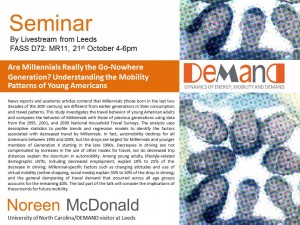 News reports and academic articles contend that Millennials (those born in the last two decades of the 20th century) are different from earlier generations in their consumption and travel patterns. This study investigates the travel behavior of young American adults and compares the behavior of Millennials with those of previous generations using data from the 1995, 2001, and 2009 National Household Travel Surveys. The analysis uses descriptive statistics to profile trends and regression models to identify the factors associated with decreased travel by Millennials. In fact, automobility declines for all Americans between 1995 and 2009, but the drops are largest for Millennials and younger members of Generation X starting in the late 1990s. Decreases in driving are not compensated by increases in the use of other modes for travel, nor do decreased trip distances explain the downturn in automobility. Among young adults, lifestyle-related demographic shifts, including decreased employment, explain 10% to 25% of the decrease in driving; Millennial-specific factors such as changing attitudes and use of virtual mobility (online shopping, social media) explain 35% to 50% of the drop in driving; and the general dampening of travel demand that occurred across all age groups accounts for the remaining 40%. The last part of the talk will consider the implications of these trends for future mobility.
News reports and academic articles contend that Millennials (those born in the last two decades of the 20th century) are different from earlier generations in their consumption and travel patterns. This study investigates the travel behavior of young American adults and compares the behavior of Millennials with those of previous generations using data from the 1995, 2001, and 2009 National Household Travel Surveys. The analysis uses descriptive statistics to profile trends and regression models to identify the factors associated with decreased travel by Millennials. In fact, automobility declines for all Americans between 1995 and 2009, but the drops are largest for Millennials and younger members of Generation X starting in the late 1990s. Decreases in driving are not compensated by increases in the use of other modes for travel, nor do decreased trip distances explain the downturn in automobility. Among young adults, lifestyle-related demographic shifts, including decreased employment, explain 10% to 25% of the decrease in driving; Millennial-specific factors such as changing attitudes and use of virtual mobility (online shopping, social media) explain 35% to 50% of the drop in driving; and the general dampening of travel demand that occurred across all age groups accounts for the remaining 40%. The last part of the talk will consider the implications of these trends for future mobility.
Noreen McDonald, from University of North Carolina, is a visiting DEMAND researcher at Leeds University.

